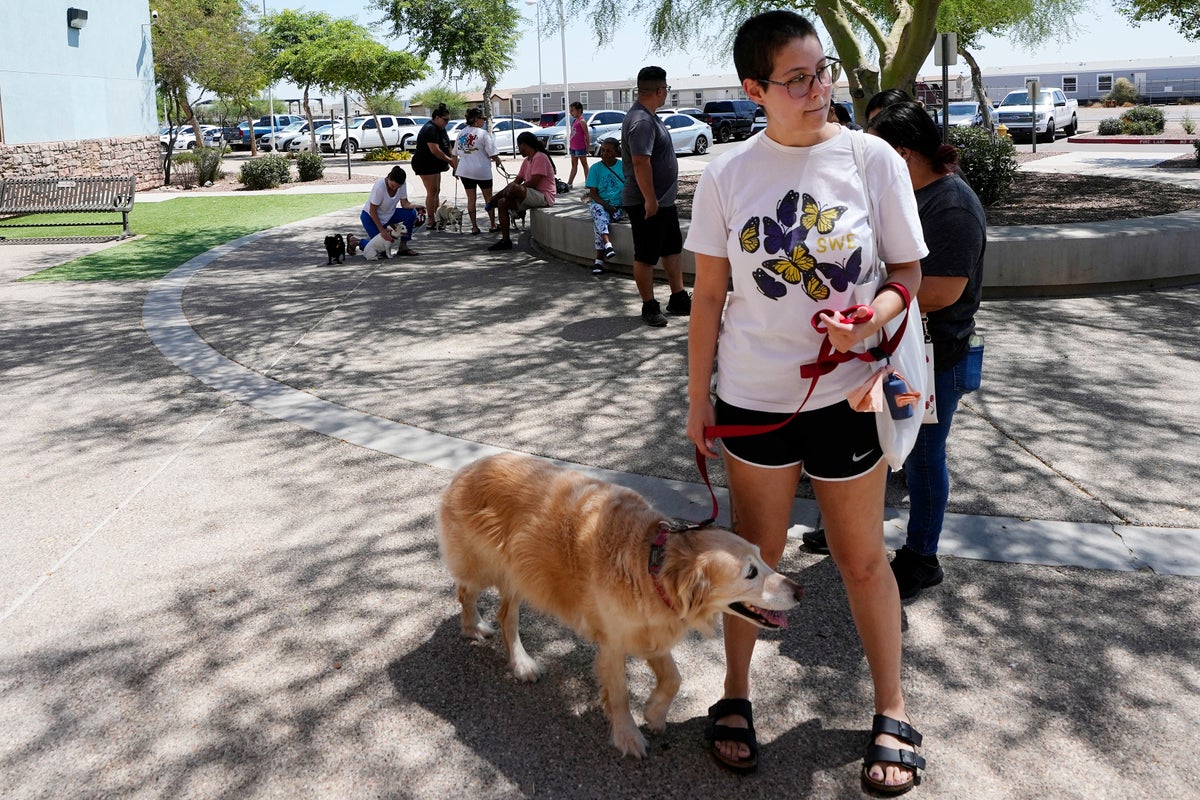
On the Friday before the Fourth of July, more than a dozen dog owners waited in triple-digit temperatures in south Phoenix to get into a microchipping event inside a shelter.
It didn't hurt that Maricopa County was offering a discount. But, several were there because they knew having a microchip with their contact information implanted in their pups would increase the likelihood of their pet being returned if the worst happens on Independence Day.
“Ava’s a scaredy-cat of any loud noises," said Rori Chang, who was there with her golden retriever. "Her immediate reaction is to hide in corners and after that, she will literally paw at you wanting you to pet her the whole time.”
Most of the U.S. may be looking forward to Tuesday for dazzling displays of fireworks or setting off firecrackers and poppers with their neighbors. Those with furry, four-legged family members — maybe not so much. They're searching for solutions to the Fourth of July anxiety that fireworks bring.
Their behavior can range from cowering in corners to running away from home. Trying to figure out what will soothe a dog can practically feel like an annual tradition in itself.
Without fail, Dr. Kelley DeGroff, a veterinarian in Phoenix, gets requests for anxiety medication from some pet owners starting two weeks before July 4. This past week, there have been two to three requests daily.
"I think it has to do with certain breeds. Obviously, hunting dogs are bred for that purpose and they don't typically have any issues with it. But a lot of other dogs, it seems to trigger a fight-or-flight response in them," DeGroff said.
DeGroff prescribes either a gum gel that helps with noise phobia or anxiety pills. She is expecting numerous requests for meds as late as Monday. But dog owners shouldn't be asking so close to the holiday. A week before is best.
“That way, when they give you medication you can do a trial dose beforehand so that you know what to expect and you know it's going to do what you want it to do,” DeGroff said.
If you don't have time to obtain veterinarian assistance, she suggests calming supplements or a ThunderShirt, a wrap that is supposed to feel like a gentle hug for the dog.
Doggy day cares are also trying to offer more resources. The franchise owners of several Phoenix-area locations of Dogtopia, a nationwide company, have brought in two to three additional staff over the past couple years, according to marketing manager David Duran.
On Tuesday, they will be extending pickup hours until 11 p.m. if pet parents want to enjoy festivities a little longer. Even though the playrooms are mostly soundproof, employees will be having “dance parties” and blasting music to help block out the sound of fireworks.
One fireworks seller in Butte, Montana, has found a way to be part of the solution.
Bille Jo Gonzales is now in her fourth year of selling CBD dog treats at Gonzo's Fire of Mines fireworks in Butte, Montana. She saw the treats made by local baker Heidi Johnson on Facebook and reached out.
“It helps my business because my business is actually creating the problem,” Gonzales said.
It's a win-win situation that she thinks more fireworks vendors should consider.
“I’d say it’s increased our business and it's great for advertising,” Gonzales said.
Unfortunately, dogs inevitably go missing nationwide every July Fourth. That's where shelters come in, picking up more strays than usual in the days following.
Maricopa County's two shelters are already currently over capacity with more than 800 dogs, so they will be hard-pressed to receive any more during the holiday. Not as many dogs were brought there on July Fourth during the coronavirus pandemic because fireworks shows were fewer, said Kim Powell, spokesperson for Maricopa County Animal Care and Control. But with most local fireworks productions back on, county shelters are expecting the number of dogs arriving to jump by 30%-60%.
“This is something that the shelter world dreads all year long,” Powell said. “We started talking about planning ahead of this back in March.”
Those conversations are what led to the county's microchipping event. If you don't have time to get your pet microchipped, then at least write your contact information on their collar, Powell advises. Also, even if your property is enclosed, keep your dog on a leash.
“When they get spooked, they’re not thinking rationally so it’s best to just be with them, keep an eye on them,” Powell said.
Seattle resident James Pelletier is taking his own initiative to ensure nothing happens to his 6-year-old Papillon Chihuahua mix, Lilly. Pelletier is taking an inside-the-box approach and turning his home's basement apartment into a “soundproof bunker."
“I'm just going to hang some blankets over the door and then foam-insulate the small window and then put a little stereo in there and just play music that I probably can't stand for however many hours and/or days,” Pelletier said, chuckling.
For him, sanctioned fireworks shows aren't as big of a problem as residents who incessantly set off illegal fireworks or firecrackers.
“Hopefully, people will use common sense with this stuff,” Pelletier said.







